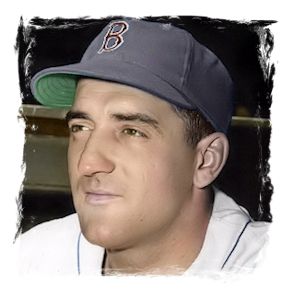 |
Phil Marchildon was born in Penetanguishene, Ontario on October 25, 1913. He attended Penentang High School and graduated in 1934 and then went to St. Michaelís College in Toronto for one year. Desiring to be self-sufficient, he quit St. Michaelís and went to work in the Creighton Nickel Mines in Sudbury, Ontario. Phil had no contact with baseball until he reached high school. Showing a talent for the game, he soon became a pitcher. Getting a job with Creighton Nickel Mines near Sudbury, he worked in the mines and played semi-pro ball. Gaining a tryout with the Toronto Maple Leafs. Phil was no youngster of 18 or 19 when he started his professional baseball career in 1939. He was 25, an advanced age for someone starting a baseball career. Sent down to Cornwall in the Canadian-American League, he pitched solidly enough to warrant a return to Toronto. The Philadelphia Athletics then purchased his contract in 1940, calling him up in September of that year. After a brief debut in 1940 he began to show some promise in 1941 with a decent ERA of 3.57. In 1942, he was learning to win, going 17-14 on a cellar-dwelling club. After his fine 1942 season he joined the Royal Canadian Air Force. He could have stayed in Canada the entire war as a physical instructor, but chose to become a gunner on a Halifax bomber and was soon sent overseas as a tail gunner. On its 26th mission in 1944, a German fighter shot the plane down. Bailing out at fifteen thousand feet with another comrade, Phil floated to a splashdown in the Sea of Denmark, 20 miles from shore and were saved by Danish fishermen. However, a German patrol was waiting for them when they got to shore, and the Danes had no choice but to turn them over. He later learned that the rest of the crew died in the crash. Phil was sent to Stalag Luft III, the prison camp 105 miles southeast of Berlin, that was made famous by the movie "The Great Escape". There he lingered for almost nine months and lost 40 pounds. Before his freedom, he and his mates had been marched around Germany by the Nazis, trying to avoid the oncoming Allied forces, especially the Russians. At one point Phil and his fellow prisoners of war were forced to march 130 miles in deep snow. He was eventually freed by a British patrol in May 1945. Nowhere near baseball condition, extremely underweight and suffering from attacks of depression, Phil returned to his hometown in Canada to recuperate. There he began to regain his health, however, he was very nervous and could not stand the relative quiet of normal life, having many nightmares and nervous sweats from his ordeals. He had survived the war, and like many others, he didnít recover from it. A fairly open, friendly enough person before the war, he came back a different, guarded man. Returning to the Aís in July, Phil did not expect to pitch for quite a while. He felt he had to work himself back into shape. In his first game since his return from the war, he threw two good innings, hurt his leg and left the game. He tried to pitch once more that season, with the same result. The 1946 season found him fit and ready to pitch, and pitching for a bad team, he compiled a 13-16 record. The next season, Phil had a great year, winning 19 and losing 9, with an earned run average of 3.22. Philadelphia made a run at the pennant in 1948, but Phil could not produce the way he had in 1947. The nerves that had been shaken by his war experiences, caught up with him again and played havoc with his personal life and his baseball performance. At the end of spring training in 1950, he was sold to Buffalo of the International League, where he lost five games and was released. Catching on with the Boston Red Sox, he was dropped after one bad relief appearance. He wound up his career in 1951 with Toronto of the International League and was released. Life after baseball was tough for Phil. Having lost confidence in himself, he sat around the house brooding and drinking beer. Friends would get him job interviews, but he would not show up, but eventually got him a job at Dominion Metal Wear Industries, a manufacturer of hospital equipment. Phil stayed there until he retired at the age of 65. Honors came to the proud Canadian in 1976, when he was elected to the Canadian Sports Hall of Fame. In 1982 he was elected to the Canadian Baseball Hall of Fame. In July 1995, celebrated as Canada Day, Phil was honored at the Toronto Sky Dome. Throwing out the first ball, he was celebrated as a Canadian hero for his baseball talent and for his bravery in World War II. Remembered for his bravery during the war and for overcoming memories that haunted him for a long time, Phil Marchildon died on January 10, 1997, at age 83, in Toronto. |
|||||
